a&e features
Images from the Deep South
A photo essay documenting LGBT life in rural Miss., Ala. and La.
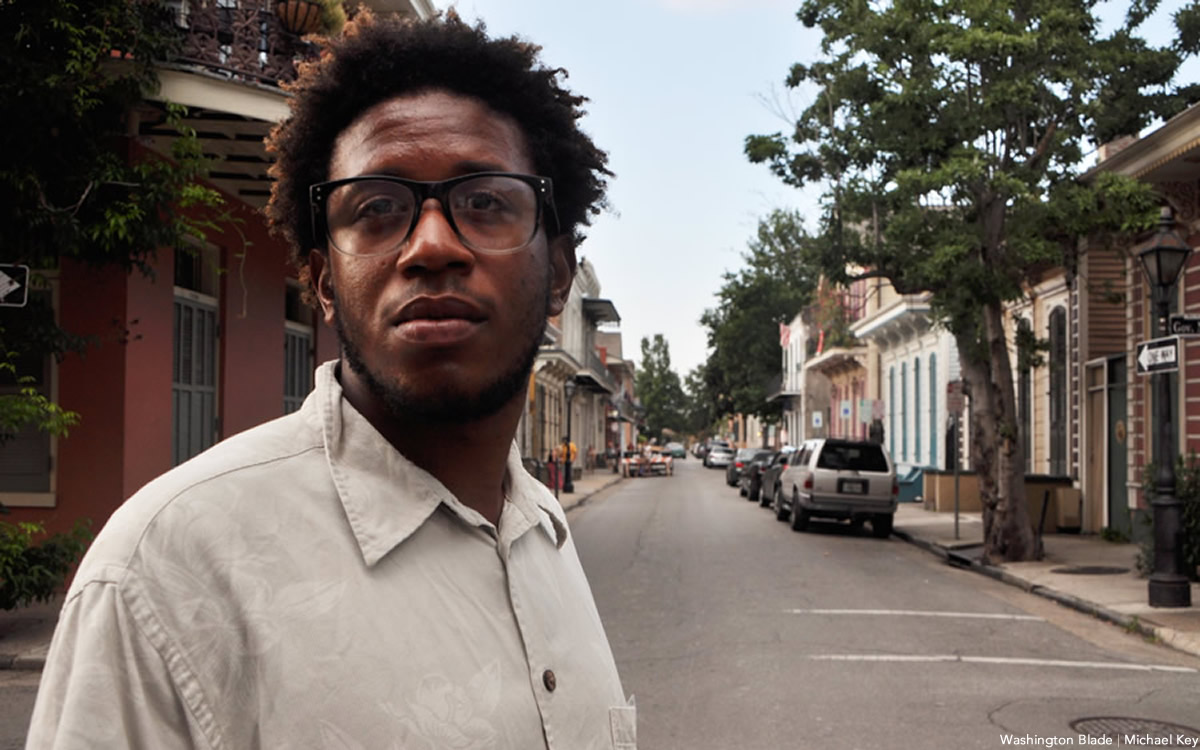
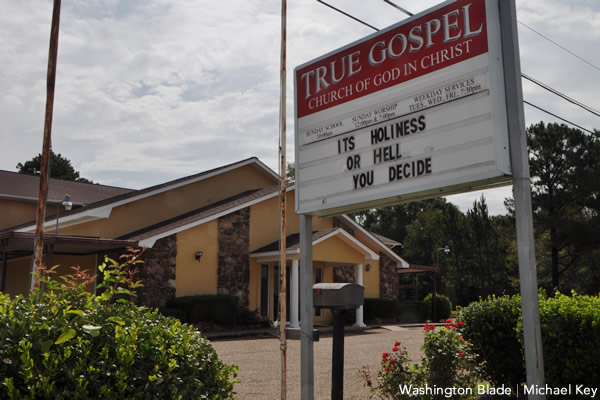
The True Gospel Church of God in Christ is near Jackson, Miss. (Washington Blade photo by Michael Key)
Blade reporter Michael K. Lavers and I earlier this year pitched the idea of going to Alabama, Louisiana and Mississippi to see what LGBT life is like in the South. Living in D.C., we wanted to see for ourselves just how different the experience was for our brothers and sisters who make their homes in places not known for LGBT inclusiveness. Our editor sent us out to gather stories and pictures. We had absolutely no idea what was in store for us.
The Dandelion Project
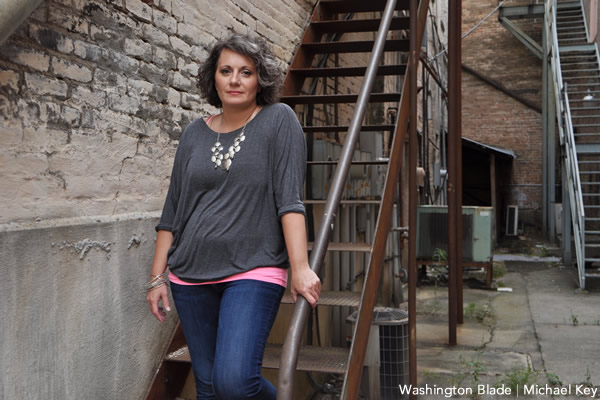
Dandelion Project founder Brandiilyne Dear met with the Washington Blade in Laurel, Miss. (Washington Blade photo by Michael Key)
Our first stop after landing at Medgar Evers International Airport in Jackson, the Mississippi state capital, was in Laurel, Miss. where we met with Dandelion Project founder Rev. Brandiilyne Dear. She told us about her life: how she had been addicted to meth, but then found a calling to the pulpit and got sober. She founded a ministry to help the many addicts who live in the Mississippi Pine Belt. Despite all that she had done through the years for her church, when it was found out that she was a lesbian, everyone — even her own family — turned against her and she “lost everything.”
Dear found her calling elsewhere with the Dandelion Project, a social support group and activist organization for LGBT people in Mississippi. She explained that dandelions are seen as weeds; something to be destroyed, yet are beautiful, ubiquitous and “a good thing.”
We spoke with members of the Dandelion Project, including several gender non-conforming youth who were eager to share their stories of social isolation and the violence and hatred they face.
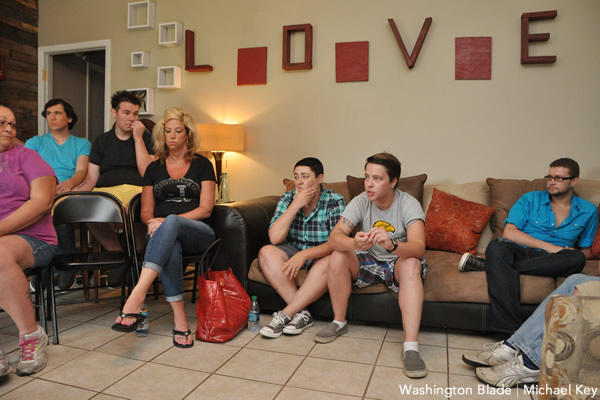
Members of the Dandelion Project meet in Dear’s Mississippi home. (Washington Blade photo by Michael Key)
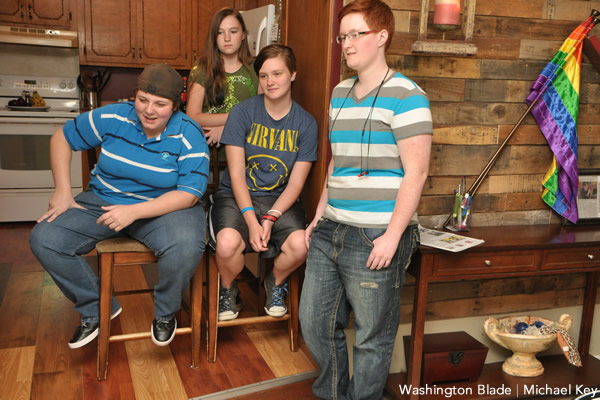
Members of the Dandelion Project gather to discuss issues in a home in Laurel, Miss. (Washington Blade photo by Michael Key)
Despite the daily discrimination they all said they experience, most members of the Dandelion project were proud to continue the fight for equality in their home state. One young person, however, who had just been through a harrowing run for her life from a group intent on doing her harm wished for Mississippi to “fall into the Gulf” of Mexico.
Mississippi Delta
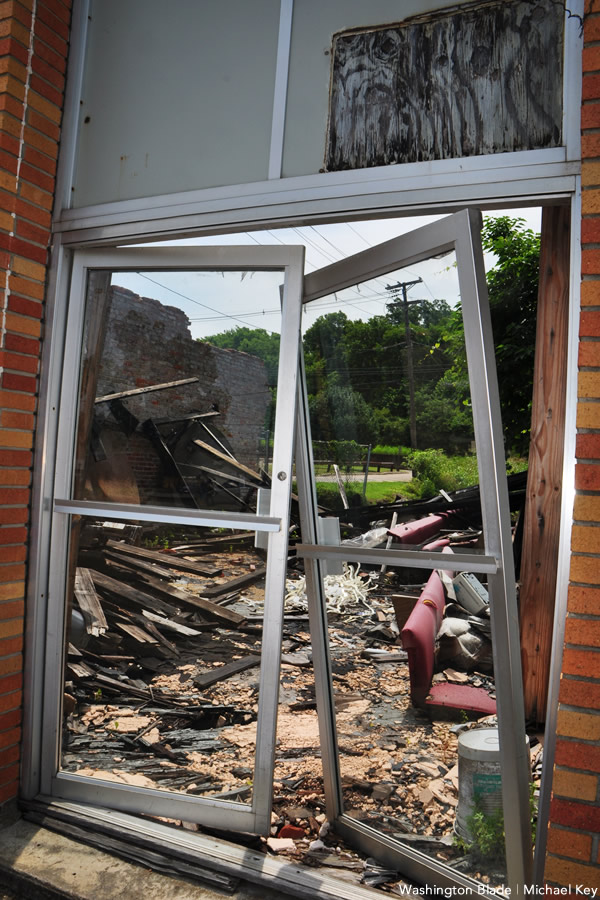
One of the many ruined structures along Main Street in Yazoo City, Miss. stands as a monument to the tornado which passed through the city four years ago. (Washington Blade photo by Michael Key)
Our next stop was in the verdant but poverty-stricken Mississippi Delta. After passing small farming towns and long stretches of countryside, we arrived at the “Gateway to the Delta,” Yazoo City, where we had an appointment with the newly elected Mayor Diane Delaware. A cosmopolitan woman who had worked “all around the world,” Delaware told us that she had “no problem” with same-sex marriage.
Yazoo City, and indeed the entire Mississippi Delta, seemed to have much bigger things to worry about than marriage equality. Abject poverty was compounded with joblessness to make for a grim future for many residents. A tornado had passed through Yazoo City four years before, leaving vast swaths of the city in ruins. The city didn’t have money or private investment to repair its downtown.
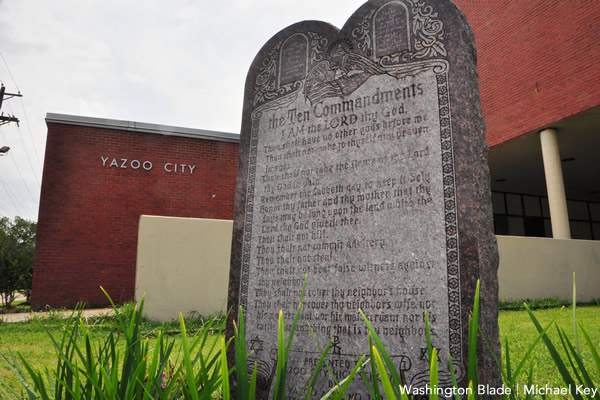
A Ten Commandments marker stands in front of Yazoo City Boys & Girls Club. Such markers are fairly common in Mississippi. (Washington Blade photo by Michael Key)
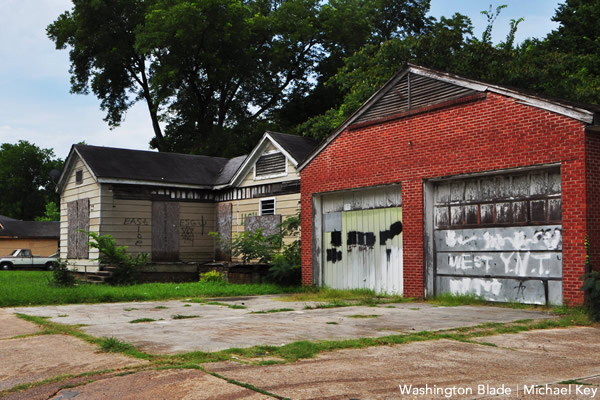
Several homes in Yazoo City, Miss. remain shuttered. (Washington Blade photo by Michael Key)
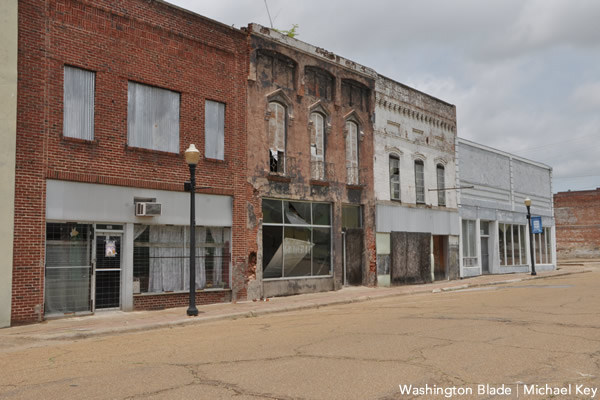
Blocks of Main Street, Yazoo City, Miss. remain largely abandoned. (Washington Blade photo by Michael Key)
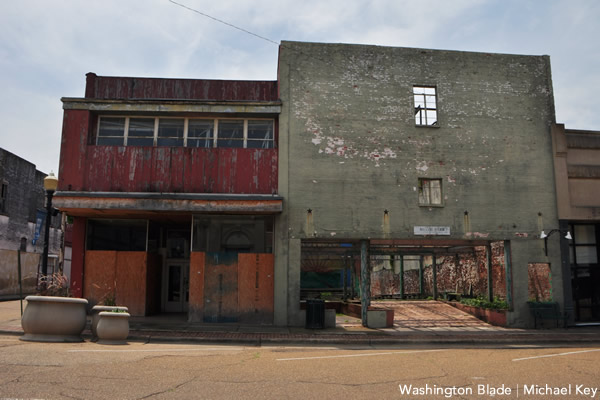
A tornado devastated Main Street, Yazoo City, Miss. four years ago. (Washington Blade photo by Michael Key)
We drove deep into the Mississippi Delta to Greenville on the the Mississippi River. There, we met with an out school teacher, Ryvell Fitzpatrick.
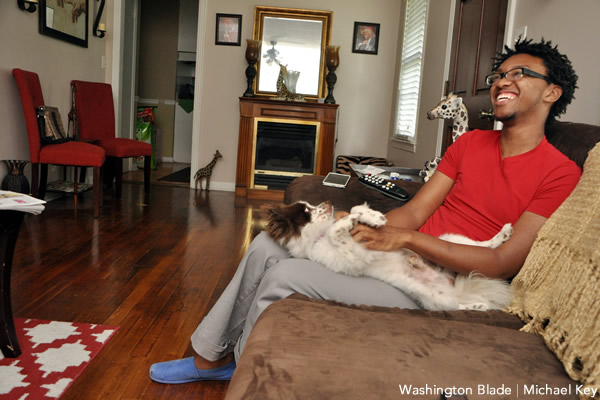
Ryvell Fitzpatrick is a teacher in Greenville, Miss. (Washington Blade photo by Michael Key)
The reluctant pioneer described his life to us as someone who has managed to thrive, despite the difficulties.
We Don’t Discriminate Campaign
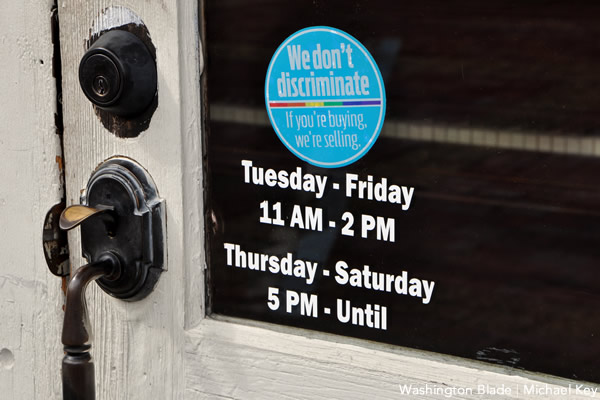
A Mississippi law that opponents argue allows business owners to deny services to LGBT people based on their religious beliefs took effect on July 1. (Washington Blade photo by Michael Key)
Back in Laurel, Dear pointed out the “We Don’t Discriminate” signs on select local businesses. The signs had been placed in store windows following the passage of SB-2681 — the Mississippi Religious Freedom Restoration Act, or so-called “Turn Away the Gays Bill.”
We went to Jackson to track down the organizers of the We Don’t Discriminate Campaign.
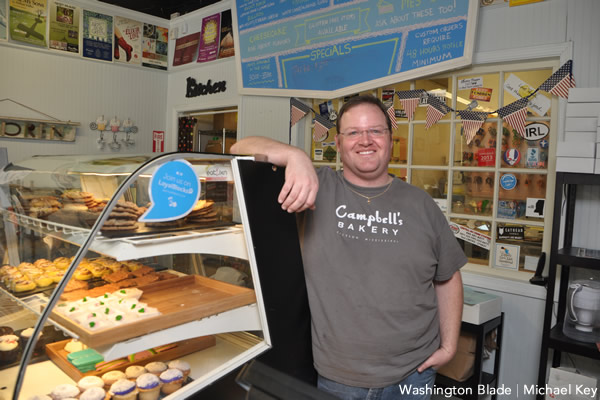
Campbell’s Bakery owner Mitchell Moore is the founder of the ‘We Don’t Discriminate’ campaign. (Washington Blade photo by Michael Key)
We spoke with the founder: a self-described “straight, married, Republican, Christian” entrepreneur named Mitchell Moore who was disgusted that his bakery, the only wedding cake bakery within the Jackson city limits, would be used as a rallying cry for homophobes in the state Senate to justify the anti-gay bill. Following the interview, Moore gave us a large box of confections.
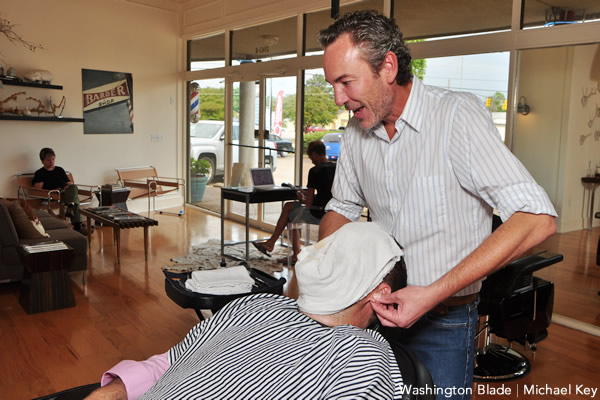
Eddie Outlaw owns a barbershop and salon in Jackson, Miss. (Washington Blade photo by Michael Key)
My reporter traveling companion got a beard trim as he interviewed salon and barbershop owner Eddie Outlaw. Outlaw and his husband Justin McPherson, the subjects of the documentary, “A Mississippi Love Story,” told us about their involvement in the campaign.
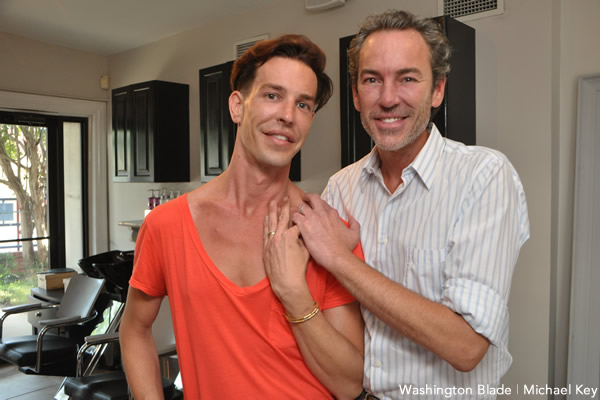
Justin McPherson Outlaw and Eddie Outlaw, owners of a hair salon and barber shop in Jackson, Miss., married in California last year. (Washington Blade photo by Michael Key)
We met with a group of LGBT rights advocates who spent their evening drinking beer, eating hors d’oeuvres and stuffing envelopes with “We Don’t Discriminate” stickers.
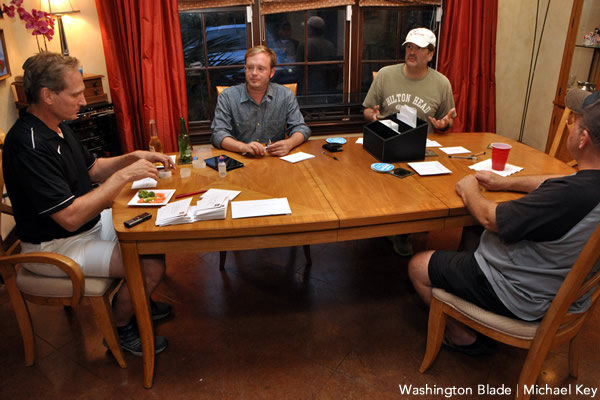
Activists in Jackson, Miss. fill envelopes with ‘We Don’t Discriminate’ literature. (Washington Blade photo by Michael Key)
They were all excited by the success of the campaign in generating buzz around the nation, and hopeful about change to come.
Late at night, we met with performance artist Constance Gordon in the dressing room of a club frequented by LGBT people of color. She explained to us the intersection of race, class and gender and other dynamics in play in Mississippi. Like most we spoke with, she was proud to be from Mississippi, though she acknowledged the rampant discrimination that LGBT people face in her home state.
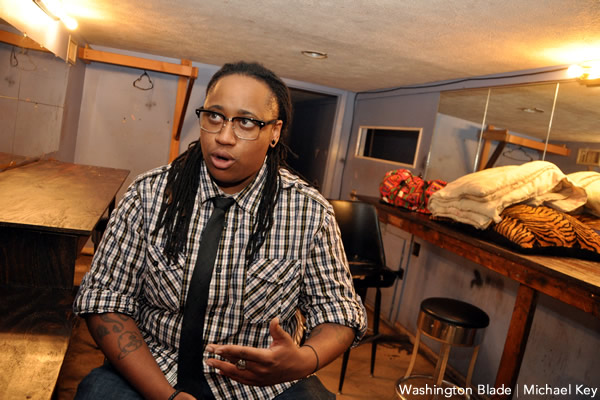
Constance Gordon is a performance artist and promoter in Jackson, Miss. (Washington Blade photo by Michael Key)
The next day, before moving on to Louisiana, we met with HIV/AIDS service providers and advocates at Open Arms Healthcare Center in Jackson. We met the “AIDS Lady,” as she referred to herself, Charlotte “Dot” Norwood. She told us of the struggles that many clients face, including accessing healthcare, finding jobs and even getting enough to eat.
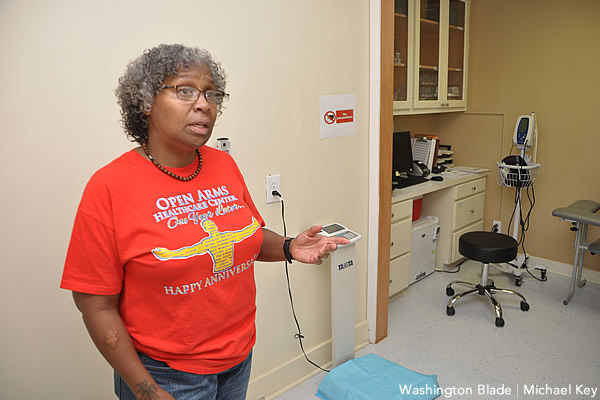
Charlotte “Dot” Norwood has spent years in the fight against HIV/AIDS. (Washington Blade photo by Michael Key)
We also had the pleasure of meeting client-turned-advocate Antwan Matthews. He related to us his story of being a great student but being kicked out of his home when his family found out that he is gay and HIV positive. Despite all of that, he managed to become a peer HIV educator and put himself through college. He is looking forward to graduating with a degree in biology soon.
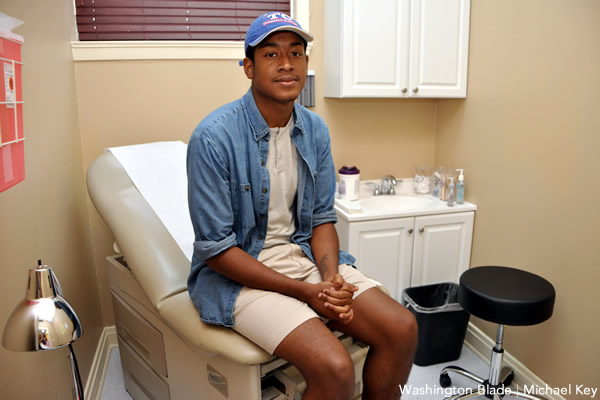
Antwan Matthews is a student and peer HIV educator. (Washington Blade photo by Michael Key)
Baton Rouge
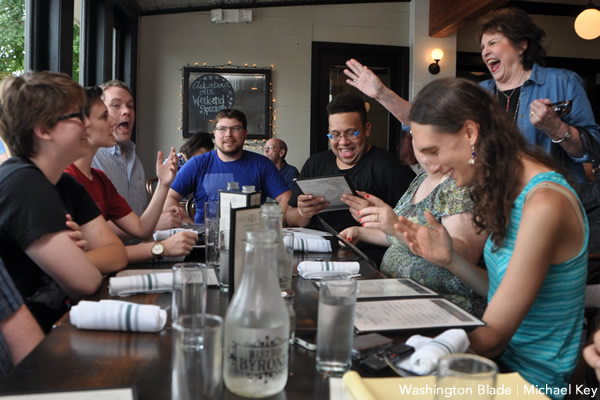
Carol Frazier, on upper right, greets fellow LGBT rights advocates at a restaurant in Baton Rouge, La., on July 12, 2014. (Washington Blade photo by Michael Key)
We left Mississippi behind and drove south to Baton Rouge. We stopped at Bistro Byronz to meet with members of PFLAG Baton Rouge, Equality Louisiana, Louisiana Trans Advocates and Baton Rouge Pride. Michael tried to start the interviews, but the ebullient Carol Frazier of PFLAG insisted that in the South, people eat together before they get down to business. We polished off our crawfish étouffée and listened to stories from the gathered activists about their lives and work.
Many of those gathered at our table struggled with poverty and employment, like transgender woman Ksaa Zair who had difficulty in finding a job because of her gender presentation and had to resort to illegally attaining hormones over the Internet because she could not afford proper medical care in the U.S., or her roommate Sergio Oramas who worked as many overtime hours as he could at a warehouse, yet struggled to pay rent.
Other advocates we spoke with dealt with loss, like Frazier: her gay son had committed suicide. She then dedicated her life to helping LGBT people as the president of PFLAG Baton Rouge until health issues forced her to take a less active role.
All of the assembled activists had come together as a close-knit community. After Hurricane Katrina, tens of thousands of people moved to Baton Rouge and the nascent LGBT community began to solidify. The city’s first Pride celebration was held in 2007, organized by Tom Merrill and other members of Baton Rouge Pride.
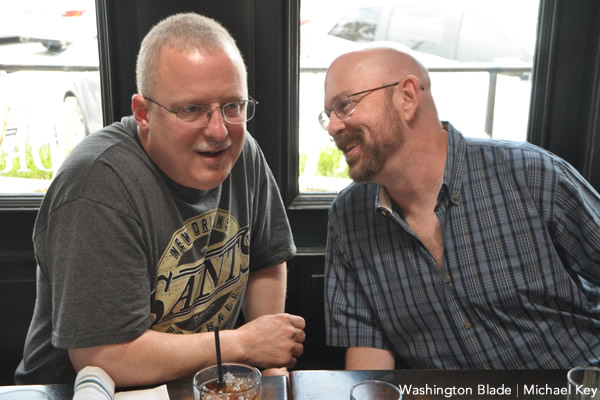
From left; Tom Merrill and Rick Cain are organizers of Baton Rouge Pride. (Washington Blade photo by Michael Key)
After many hugs and farewells to our friendly dining companions, Michael and I left the sweltering heat of Baton Rouge and drove through the swamps of Louisiana to New Orleans.
New Orleans
After spending an evening touring the French Quarter and sampling crawfish pie and signature “hand grenade” drinks on Bourbon Street, Michael and I got some much-needed rest.
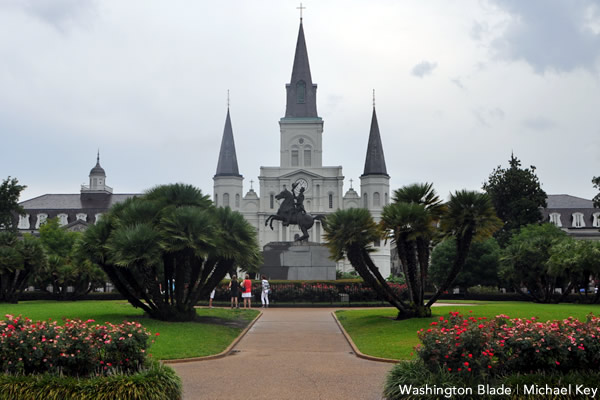
The St. Louis Cathedral in the French Quarter of New Orleans is a spot popular with tourists. (Washington Blade photo by Michael Key)
The next day, we met with activists in Metairie, La. who told us of the ups and downs of LGBT life in the New Orleans area. PFLAG New Orleans Co-President Julie Thompson, who had lost her gay son due to a medical emergency in the middle of a hurricane, beamed proudly about the time she went to Southern Decadence with him and how nice everyone was to her at gay bars. She, and the others gathered, spoke of how different everything was after Katrina and how the once-vibrant LGBT community of New Orleans was only now getting to where it was before the levees burst.
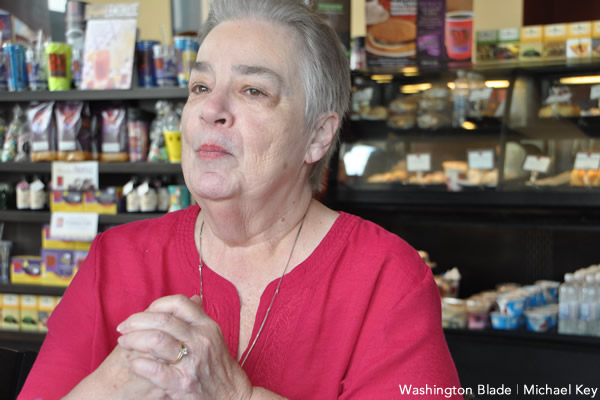
Co-President of PFLAG New Orleans Julie Thompson recalled many happy memories with her late gay son. (Washington Blade photo by Michael Key)
Louisiana Trans Advocates President Elizabeth Anne Jenkins told us how the destruction of the city meant the wholesale dismantling of an infrastructure for support for the local trans population, from doctors to support networks.
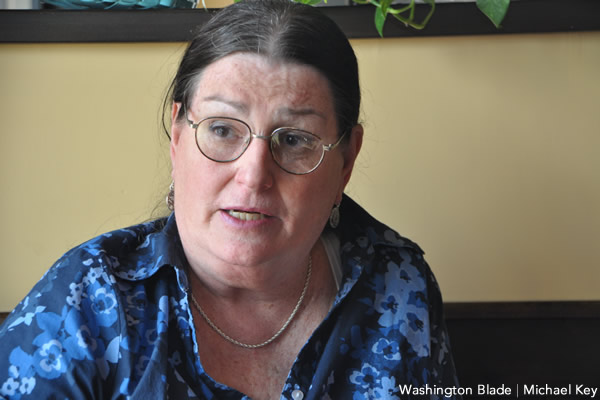
Elizabeth Anne Jenkins is the president of Louisiana Trans Advocates. (Washington Blade photo by Michael Key)
Michael and I wanted to see the devastated Lower Ninth Ward for ourselves. There were rows and rows of foundations with no houses, empty streets with only weeds on the block. But there were bright spots. The Make It Right Foundation had rebuilt a portion of the neighborhood with gleaming, eco-friendly, hurricane resistant homes.
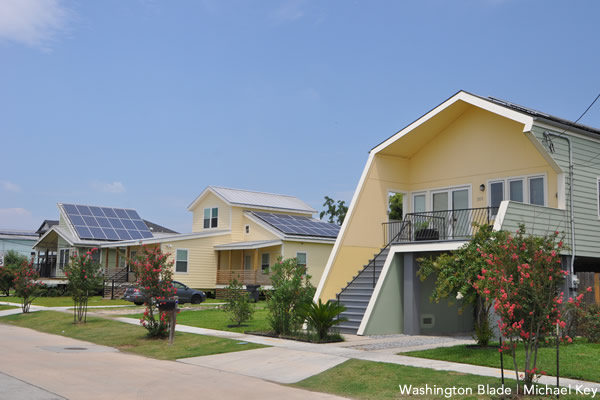
Several eco-friendly homes have been built in the Lower Ninth Ward. (Washington Blade photo by Michael Key)
But, it only took a trip across the bridge to the Upper Ninth Ward to see that the region is far from recovered. Many homes remain boarded shut, overgrown with creeping vines.
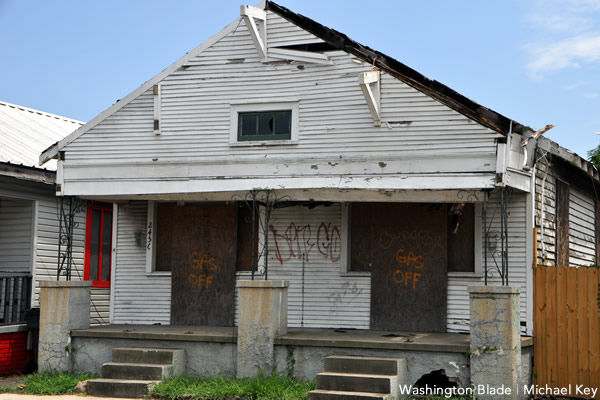
Several homes remain shuttered in the Upper Ninth Ward of New Orleans nine years after Katrina. (Washington Blade photo by Michael Key)
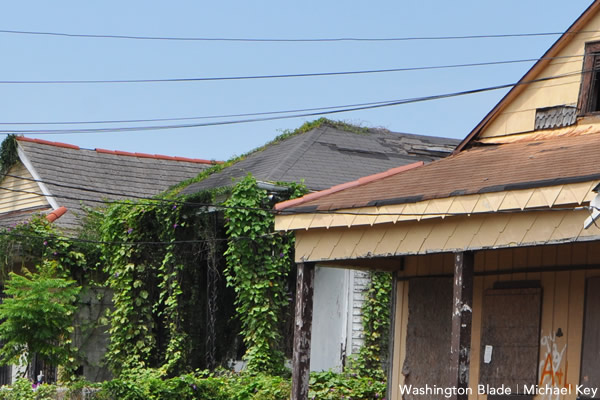
Homes in the Upper Ninth Ward of New Orleans have been reclaimed by nature and sit abandoned. (Washington Blade photo by Michael Key)
HIV in New Orleans
That evening, we met with peer educator Timothy Thompson of the New Orleans AIDS Task Force for dinner in the French Quarter. He told us of the problem of the stigma of an HIV-positive diagnosis driving many to avoid being tested. Many misconceptions about HIV/AIDS persist among people that Thompson had met with, including fears that HIV could be spread by sharing a meal.
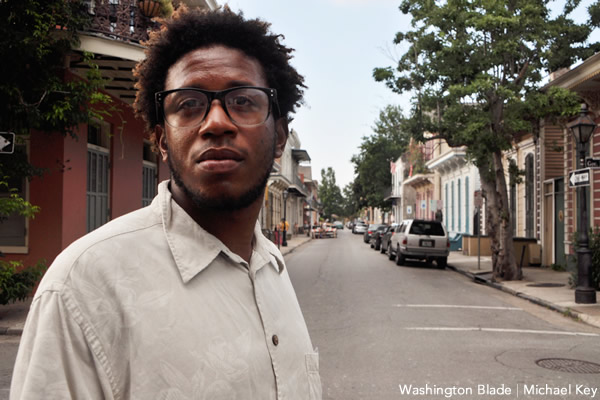
Timothy Thompson is a peer educator with New Orleans AIDS Task Force. (Washington Blade photo by Michael Key)
In the morning, we made our last stop in New Orleans: Belle Reve. Belle Reve is a residence for people with HIV that provides medical care and helps residents to get back on their feet. Vicki Weeks, its executive director, told us of all of the programs offered at the center and proudly guided us around. She, and other staff and residents, had been through a traumatic several months living as refugees in the aftermath of Katrina. But the center is now restored and provides life-saving treatment to people who are often at the end of their rope.
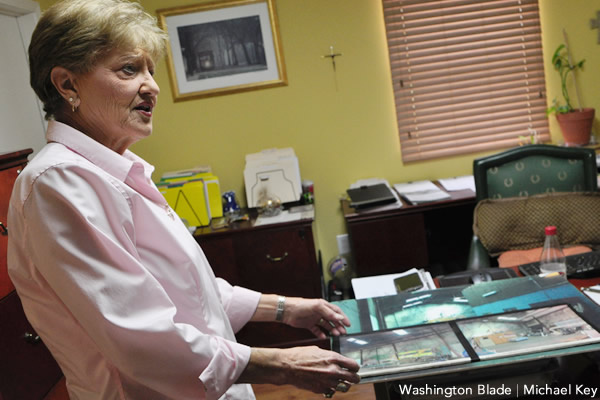
Belle Reve Executive Director Vicki Weeks shows photos of the hurricane damage to the Belle Reve facility. (Washington Blade photo by Michael Key)
One such resident was Carl Green who had lost his job after it was discovered that he was HIV positive. He became homeless and without access to medical treatment, deteriorated rapidly. Belle Reve took him in and nursed him back to health.
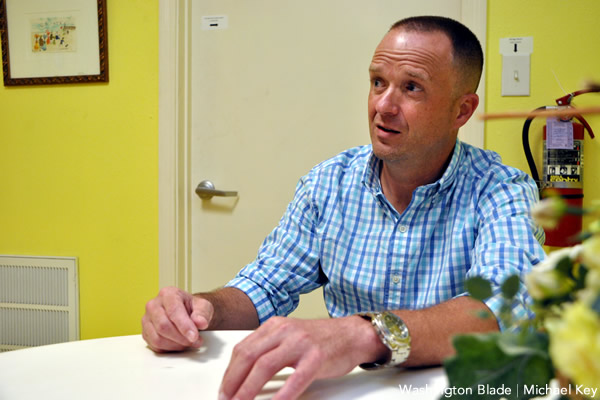
Carl Green is a resident at Belle Reve. (Washington Blade photo by Michael Key)
We also met with Miss Eddie who had ridden out Katrina in New Orleans before becoming a resident at Belle Reve.
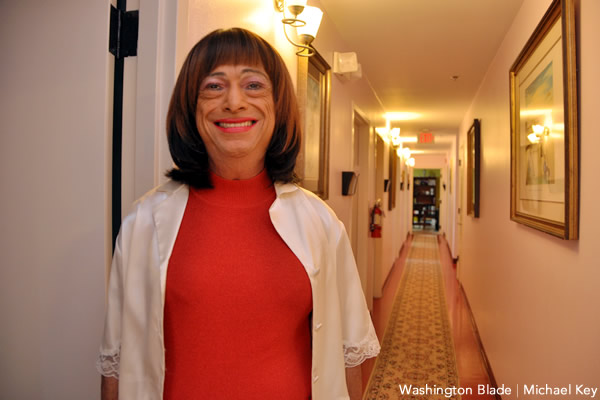
Miss Eddie told the Blade, ‘It’s a great blessing being here,’ in the Belle Reve facility in New Orleans. (Washington Blade photo by Michael Key)
Gulf Coast
We left New Orleans and drove to the Mississippi Gulf Coast. Where houses once stood along the shore, now only foundations remained. Many had rebuilt, but the scars of the hurricane were ever present.
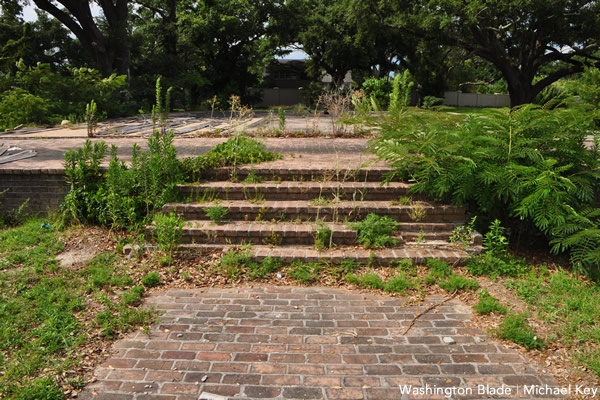
Foundations are all that remain of many homes along the Gulf Coast in Gulfport, Miss., destroyed during Hurricane Katrina. (Washington Blade photo by Michael Key)
Our first stop on the coast was to meet Jeff White and John Perkins, co-founders of the Mississippi Gulf Coast Lesbian and Gay Community Center. We shared queso and a margarita with them at a Mexican restaurant in Gulfport. They told us of how it was difficult for LGBT people to be out in any capacity in the area. They were even worried that the people in the restaurant might be looking at us. White then related a horrifying story about how he had been repeatedly raped by a teacher at his private Baptist school as an openly gay teenager to make him “hate men and change.”
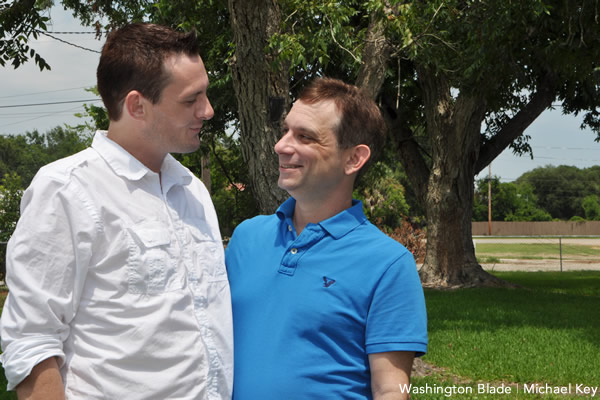
Jeff White and John Perkins are the co-founders of the Mississippi Gulf Coast Lesbian and Gay Community Center. (Washington Blade photo by Michael Key)
We drove along the coast to a mall in nearby Biloxi, where we met with Jennifer and Jena Pierce and a trans man who preferred to remain anonymous. The Pierces married in Connecticut last December, yet lived in Mississippi. They had considered moving to a place more accepting of their relationship, but decided to stay for the sake of their young daughter who is in school. The married couple had faced discrimination on a number of occasions. Jena Pierce told us that an employee at the DMV office loudly gathered her coworkers and told her she could not change the last name on her driver’s license because the state would not recognize her marriage. The DMV worker proceeded to publicly embarrass her, leaving her sobbing in her car.
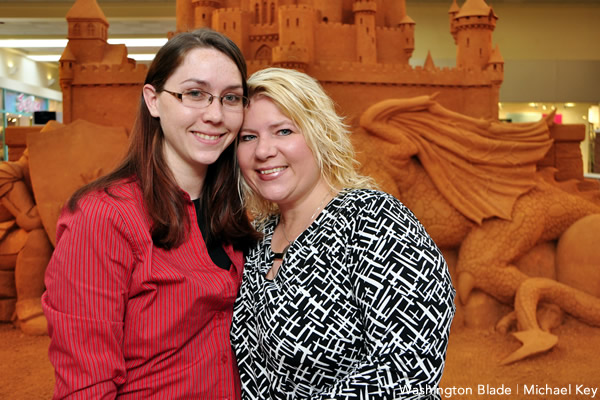
Jennifer and Jena Pierce are a married couple in Biloxi, Miss. (Washington Blade photo by Michael Key)
Jennifer Pierce had also experienced discrimination when trying to take a family leave day to take their daughter to the doctor’s office. Her workplace wouldn’t let her go because their daughter isn’t her biological daughter — even though the people making the decision had been guests at the Pierces’ wedding reception.
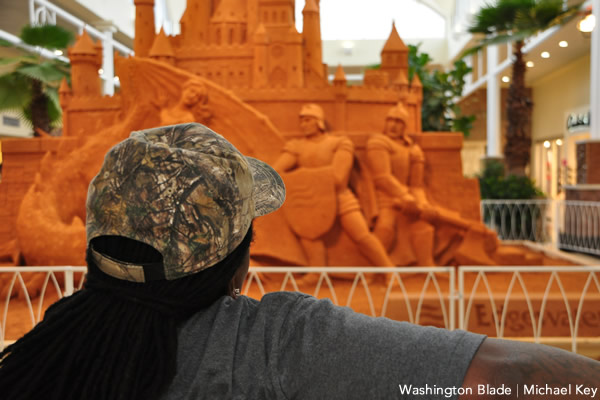
A trans man on the Gulf Coast preferred to remain anonymous but spoke to the Blade about his experience as a trans man living on the Gulf Coast. (Washington Blade photo by Michael Key)
Alabama
It was in the early evening when we pulled into the parking lot of Laps on the Causeway, a sprawling restaurant along a thin stretch of land in the middle of Mobile Bay. Michael and I battled a swarm of gnats to meet with Lane Galbraith on the outdoor deck of his favorite restaurant. The trans man who had founded LGBT Wave of Hope, a Mobile LGBT advocacy organization, told us of the pervasive closet of Alabama and the struggles of the LGBT people who live there.
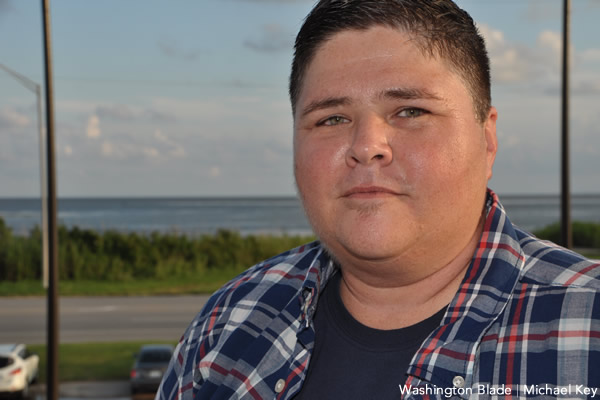
Lane Galbraith is the founder of LGBT Wave of Hope in Mobile, Ala. (Washington Blade photo by Michael Key)
Our final leg of the trip was something that I had been looking forward to for weeks. We drove to Montgomery, Ala. to visit the Southern Poverty Law Center (SPLC). There was as much security at the SPLC as one would expect at the White House. After passing through many checkpoints, I wasn’t even allowed to take pictures inside the massive building. The SPLC’s precautions were well-founded however, as the watchdog organization had been targeted many times by hate groups resulting in fire bombings. We visited the Civil Rights Memorial and got background on the SPLC’s LGBT-specific cases. We met with SPLC lawyers David Dinielli and Sam Wolfe who specialize in LGBT issues.
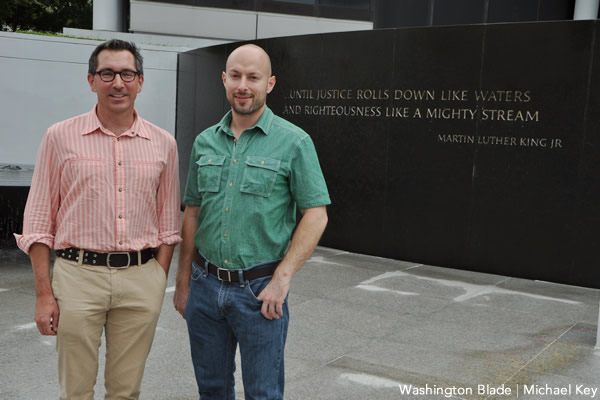
Southern Poverty Law Center Deputy Legal Director David Dinielli and lawyer Sam Wolfe met with the Washington Blade at the Civil Rights Memorial in Montgomery, Ala. (Washington Blade photo by Michael Key)
After meeting with the lawyers, we were granted a visit to the SPLC’s Civil Rights Museum. Upon seeing a display that related the horrifying death of a man in an anti-gay attack, my traveling companion started sobbing. I felt a strange confluence of emotions from the mental and emotional toll our trip had taken as well. After we left the museum, we walked in silence around Montgomery. Signs of the Confederacy were all around us, including the Confederate “White House” of Jefferson Davis.
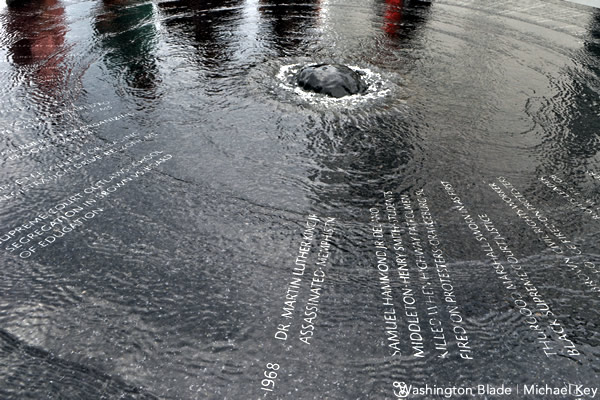
The circular Civil Rights Memorial in Montgomery, Ala. lists martyrs to the cause of civil rights, with a blank spot left for people who came before and those who are yet to come. (Washington Blade photo by Michael Key)
On the last day of our trip, Michael and I were both mentally exhausted, but we had one more important person to talk with. Kathie Heirs of AIDS Alabama met us in her offices in Birmingham to talk about the strides made in combatting the HIV/AIDS epidemic in the state.
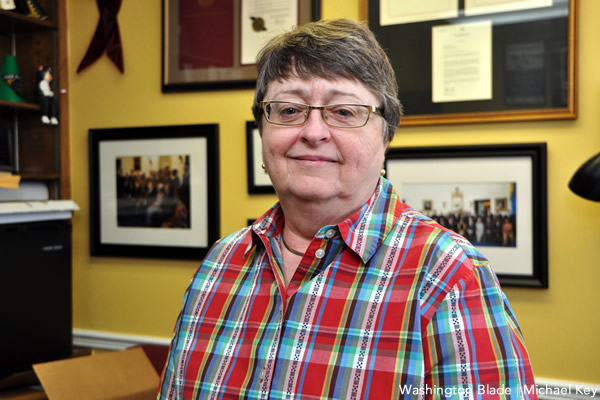
Kathie Hiers is the CEO of AIDS Alabama. (Washington Blade photo by Michael Key)
Michael and I dropped off the rental car at the airport in Birmingham and had a silent drink together while waiting on our flight back to D.C. The many stories I had heard were swirling around in my head and I was too close to it then to make sense of it. I did know two things: I would never take living in a place like Washington for granted again and I would never again succumb to the comforting lie that our full equality had already been won nationwide. The people we had met in the South were amazing and courageous and had built a community in difficult circumstances. Most all of the people we had spoken with had a sense of pride of place and felt a duty to make their town or city a more welcoming home for the next generation of LGBT people.
a&e features
Meet D.C.’s Most Eligible Queer Singles
Our annual report, just in time for Valentine’s Day

Just in time for Valentine’s Day, the Blade is happy to present our annual Most Eligible Singles issue. The Singles were chosen by you, our readers, in an online nominations process.
John Marsh

Age: 35
Occupation: DJ and Drag Entertainer
How do you identify? Male
What are you looking for in a mate? I’m looking for someone who’s ready to dive into life’s adventures with me. someone independent and building their own successes, but equally open to supporting each other’s dreams along the way. I know that probably sounds simple because, honestly, who isn’t looking for that? But my life and career keep me very social and busy, so it’s important to me to build trust with someone who understands that. I want a partner who knows that even when life gets hectic or I’m getting a lot of attention through my work in the community, it doesn’t take away from my desire to build something real, intentional, and meaningful with the right person.
Biggest turn off: My biggest turnoff is arrogance or judgment toward others. I’m most drawn to people who are comfortable being themselves and who treat everyone with the same level of respect and care. I’ve worked hard for the success I’ve found, but I believe in staying humble and leading with kindness, and I’m attracted to people who live the same way. I’m also turned off by exclusionary mindsets, especially the idea that sapphic folks don’t belong in gay spaces. Our community is vibrant, diverse, and strongest when it’s shared with everyone who shows up with respect and love
Biggest turn on: I’m drawn to people who can confidently walk into new spaces and create connection. Being able to read a room and make others feel comfortable shows emotional intelligence and empathy, which I find incredibly attractive. I also come from a very social, open, and welcoming family environment, so being with someone who embraces community and enjoys bringing people together is really important to me.
Hobbies: I have a lot of hobbies and love staying creative and curious. I’m a great cook, so you’ll never have to worry about going hungry around me. In my downtime, I watch a lot of anime and I will absolutely talk your ear off about my favorites if you let me. I’m also a huge music fan and K-pop lover (listen to XG!), and I’m a musician who plays the cello. I spend a lot of time sewing as well, which is a big part of my creative expression. My hobbies can be a little all over the place, but I just genuinely love learning new skills and trying new things whenever I can.
What is your biggest goal for 2026? This year feels like a huge milestone for me. I’m getting ready to join a tour this summer and want to represent myself well while building meaningful connections in every city I perform in. I’m also focused on growing as a DJ, sharing more mixes and content online, and reaching a big creative goal of releasing original music that I’m producing.
Pets, Kids or Neither? I have a lovely Akita named Grady that I’ve had for 10 years and always want pets in my life. I’m open to kids when/if the time is right with the right person.
Would you date someone whose political views differ from yours? Hell no. I don’t see political differences as just policy disagreements anymore – they often reflect deeper values about how we treat people and support our communities. I’m very progressive in my beliefs, and I’m looking for a partner who shares that mindset. For me, alignment in values like equity, compassion, and social responsibility is non-negotiable in a relationship. To be very clear about my beliefs, I’m outspoken about my opposition to immigration enforcement systems like ICE and believe both political parties have contributed to policies that have caused real harm to vulnerable communities. I’m also deeply disturbed by the ongoing violence in Palestine and believe we need to seriously examine our support of military actions that have resulted in the loss of countless innocent lives. These aren’t abstract political opinions for me, they are moral issues that directly inform who I am and what I stand for.
Celebrity crush: Cocona
Name one obscure fact about yourself: I used to own a catering business in college that paid for my school — I also went to a Christian college, lol.
Jackie Zais

Age: 35
Occupation: Senior director at nonprofit
How do you identify? Lesbian woman
What are you looking for in a mate? Looking for someone who’s curious about the world and the people in it — the kind of person who’s down to explore a new spot one night and stay in with takeout the next. Confident in who they are, social without being exhausting, adventurous but grounded, thoughtful but not pretentious. Someone who can be funny while still taking life (and relationships) seriously.
Biggest turn off: Doesn’t have strong opinions. I love hearing a wild hot take.
Biggest turn on: When someone can make me belly laugh.
Hobbies: Number one will always be yapping with friends over food, but I also love collecting new hobbies. Currently, I crochet (and have some dapper sweater vests as a result), listen to audiobooks on what I personally think is a normal speed (2x) and play soccer and pickleball. But I’ve tried embroidery, papier-mâché, collaging, collecting plants, scrap booking, and mosaic.
What is your biggest goal for 2026? I’ve recently started swimming and I want to look less like a flailing fish and more like someone who knows what they’re doing.
Pets, Kids or Neither? I have neither but open to kids
Would you date someone whose political views differ from yours? My best friend is a moderate Democrat and that’s as far right as I’m willing to go.
Celebrity crush: Tobin Heath
Name one obscure fact about yourself: I’m the daughter of Little Miss North Quincy 1967.
Kevin Schultz

Age: 39
Occupation: Product manager
How do you identify? Gay
What are you looking for in a mate? You know 2001’s hottest Janet Jackson single, “Someone to Call My Lover?” To quote Janet, “Maybe, we’ll meet at a bar, He’ll drive a funky car; Maybe, we’ll meet at a club, And fall so deeply in love.”
Realistically though, I’d love to find someone who loves to walk everywhere and who avoids the club because it’s too loud and crowded. Later in the song, our songstress opines “My, my, looking for a guy, guy, I don’t want him too shy; But he’s gotta have the qualities, That I like in a man: Strong, smart, affectionate” and I’m quite aligned there – I’m an introvert looking for someone more extroverted.
I’m looking for someone who is different from me. When the math works, one plus one should equal two. Two becoming one is more art, and my relational approach is more science, or, I guess, math.
Biggest turn off: I’m turned off by a lot of superficially small things — chewing with one’s mouth open, dirty or untrimmed fingernails, oh, and also, lack of self awareness. My personal brand of anxiety is hyper self-aware, so I’m very turned off by someone who doesn’t realize that they exist in the world with others.
Biggest turn on: Competency. Or maybe…eyes? So perhaps, you see my conundrum — I’m very engaged by people who are deeply engaged by something, but I’d be lying if I said a sharp gaze and a wink didn’t get me. And, you know, some stamina in all avenues, mental and physical doesn’t hurt either.
Hobbies: Fixing everyone’s WiFi (this did actually get me a date once), and just generally fixing everyone’s everything. If it’s got a plug, screen, or buttons I can probably help you with it. On my own, I’m really into smart home devices and automation, and just to be timely, my latest thing is setting up and tuning my own instance of OpenClaw. (No one should actually do this, which is why I’m trying.) Together, we could also explore such hobbies as visiting every Metro station, visiting and exploring a new airport, and exploring why there are so many gay transit nerds. There’s no non-fake sounding way to say this but I also just love knowledge seeking, so I’d also love to go on an adventure with you where we learn something brand new.
What is your biggest goal for 2026? My biggest goal is to arrive to 2027 just a little better than I arrived to 2026. A few gym goals, a few personal goals, a few work goals; I hope to get a few of them across the finish line. At the risk of holding myself accountable, one of those goals is to be able to flawlessly side plank for over a minute. Please don’t mistake me for a huge gym rat; I just have a questionable relationship with balance and I’m really working on it.
Pets, Kids or Neither? I’ll just be blunt: no pets. Stating this on my Hinge profile resulted in an exponential loss of matches, so it’s very fun to trot out the idea. Primarily, I’m allergic to cats and dogs so my aversion is mostly biological. I’m not, however, allergic to kids — big fan of my various nieces and nephews — but I’d really only consider kids of my own if my chosen companion and I could financially afford them without compromise, and at this age I’ve become opinionated about the life I want to live.
Would you date someone whose political views differ from yours? No. This becomes a simpler answer with each passing day, unfortunately.
Celebrity crush: If I’m being of the moment, of course, it’s going to be one of the gentlemen on “Heated Rivalry,” but if I were to really dig into the archives it would be pre-Star Trek Chris Pine. I first saw him in an absolute train wreck of a movie called “Blind Dating” where he plays a blind guy who tries to pretend to be sighted in order to date. The movie was terrible, but I found him irresistible.
Name one obscure fact about yourself: I went suddenly deaf on one side only (my left) just before my 33rd birthday. After a bit of time in the wilderness (metaphorically) I got a cochlear implant a few years later, and it really changed my life. I will talk until someone stops me about hearing, sound, and the amazing arena of hearing loss technology. A lot of people, when they see my implant, assume I was born with hearing loss, so it’s always a bit odd (obscure even!) when I tell people I lost it as an adult. But, I also got my hearing back as an adult and am an eager advocate for assistive technology and visibility for people with disabilities that are not always immediately visible. I also work with prospective adult implant candidates to determine if an implant is right for them, because losing hearing suddenly as an adult is isolating and it’s helpful to talk to someone who’s been there.
Gabriel Acevero

Age: 35
Occupation: Maryland State Delegate
How do you identify? Gay
What are you looking for in a mate? Emotional intelligence and a sense of humor.
Biggest turn off: Fetishization.
Biggest turn on: Kindness and emotional intelligence.
Hobbies: Traveling and reading (I love books).
What is your biggest goal for 2026? More self care. I love what I do but it can also be physically taxing. In 2026, I’m prioritizing more self care.
Pets, Kids or Neither? I have neither but I’m open to both.
Would you date someone whose political views differ from yours? No.
Celebrity crush: Kofi Siriboe
Name one obscure fact about yourself: I’m a Scorpio who was raised by a Scorpio and I have many Scorpios in my life.
Vida Rangel

Age: 36
Occupation: Public Servant, Community Organizer
How do you identify? I am a queer transLatina
What are you looking for in a mate? I’m looking for a partner who is caring, socially aware, and passionate about meaningfully improving some part of this world we all live in. Ideally someone playful who can match my mischievous energy, will sing and dance with me whenever joy finds us, and will meet me at protests and community meetings when the moment calls for bold collective action.
Biggest turn off: Ego. Confidence can be cute, but humility is sexy.
Biggest turn on: Drive. Seeing someone put their heart into pursuing their goals is captivating. Let’s chase our dreams together!
Hobbies: Music in all its forms (karaoke, playing guitar, concerts, musicals…), finding reasons to travel to new places, and making (Mexican) tamales for friends and coworkers.
What is your biggest goal for 2026? My biggest goal for 2026 is to organize and a celebratory kiss on election night wouldn’t hurt.
Pets, Kids or Neither? An adorable black cat named Rio (short for Misterio)
Would you date someone whose political views differ from yours? Ma’am? If you feel the need to ask…
Celebrity crush: Mi amor, Benito Bad Bunny. Zohran Mamdani, too. I have lots of love to give.
Name one obscure fact about yourself: I worked at Chick-fil-A when I was in high school and was fired after just three months. At the time it was still legal to fire someone for being trans, but I’m pretty sure it was because I called out to go to a Halloween party.
Em Moses

Age: 34
Occupation: Publishing
How do you identify? Queer
What are you looking for in a mate? Companionship, passion, fun. I seek a confident partner who inspires me, someone to laugh and dance with, someone with a rich internal universe of interests and experiences to build upon. A lifelong friend.
Biggest turn off: Dishonesty.
Biggest turn on: I love when someone is exactly themselves, nurturing their passions and skills and showing up uniquely in this world as only they can.
Hobbies: I love to read. I create art with my hands. When the weather is nice I’m outside, walking around the District looking at flowers and trees.
What is your biggest goal for 2026? My main goal this year is to spend more time with my nieces and nephews.
Pets, Kids or Neither? No pets or children in my life currently.
Would you date someone whose political views differ from yours? While I consider myself quite openminded and genuinely enjoy learning from perspectives different from my own, I have clear boundaries around my morals and those pillars do not fall.
Celebrity crush: Luigi Mangione
Name one obscure fact about yourself: My first job was at a donut shop.
Nate Wong

Age: 41
Occupation: Strategy adviser to nonprofits and philanthropists to help ambitious ideas turn into meaningful, positive societal impact.
How do you identify? Gay (he/him)
What are you looking for in a mate? An additive partner: sociable, adventurous, and curious about the world. I’m drawn to warmth, openness, and people who show up fully — one-on-one and in community. If you enjoy a good dinner party, make eye contact, and actually talk to strangers (I know a D.C. no-no), we’ll get along just fine.
Biggest turn off: Not being present. Active listening matters to me; attention is a form of respect (and honestly, very attractive). And a picky food eater (how will we some day be joint food-critics?).
Biggest turn on: Curiosity, adventuresome spirit, and someone who can hold their own in a room — and still make others feel at ease. Confidence is best when it’s generous.
Hobbies: Splitting my time between the ceramics studio (District Clay), planning the next trip, and finding great food spots. I box to balance it all out, and I love curating small, adventurous gatherings that bring interesting people together — the kind where you stay later than planned.
What is your biggest goal for 2026? The last few years threw some curve balls. So 2026 is all about moving forward more freely and passionately, trusting what feels right and following it with intention (and joy).
Pets, Kids or Neither? Open to kids (in a variety of forms — already have some adorable god kids). A hypoallergenic dog would absolutely raise the cuddle quotient; cats are best admired from a respectful, allergy-safe distance.
Would you date someone whose political views differ from yours? I value thoughtful listening and sincere debate; shared values around the honoring of everyone’s humanity, equity, and justice matter to me and aren’t up for debate.
Celebrity crush: Bad Bunny style with Jason Momoa humble confidence (harking to my Hawaiian roots) and Idris Elba charm — range matters.
Name one obscure fact about yourself: I celebrated medical clearance by going surfing in El Salvador. I’ve also nearly been arrested in Mozambique and somehow walked away unscathed (and without complying with a bribe) — happy to explain over an excursion.
Diane D’Costa

Age: 29
Occupation: Artist + Designer
How do you identify? Queer/lesbian
What are you looking for in a mate? A cuddle buddy, a fellow jet setter, a muse! Someone to light my soul on fire (in a good way).
Biggest turn off: Apathy. I care deeply about a lot of things and need someone with a similar curiosity and zest for life.
Biggest turn on: Mutuality really does it for me — a push and pull, someone who will throw it back and also catch it. I love someone who takes initiative, shows care and compassion, and expresses fluidity and confidence.
Hobbies: You can find me throwing pottery, painting, sipping natural wine, supporting local coffee shops, and most definitely tearing up a QTBIPOC dance floor.
What is your biggest goal for 2026? Producing my first solo art show. This year I’m really leaning into actualizing all my visions and dreams and putting them out into the world.
Pets, Kids or Neither? I’ve got a Black Lab named Lennox after the one and only D.C. icon, Ari Lennox. I love supporting the youth and (made a career out of it), but don’t necessarily need to have little ones of my own.
Would you date someone whose political views differ from yours? No. Values alignment is key, but if you wanna get into the nuances of how we actualize collective liberation let’s get into it.
Celebrity crush: Queen Latifah
Name one obscure fact about yourself: I’m in the “Renaissance” movie. I know, I know slight flex… but “Crazy In Love” bottom left corner for a split second and a harsh crop, but I’m in there. “You are the visuals, baby” really hit home for me.
Donna Marie Alexander

Age: 67
Occupation: Social Worker
How do you identify? Lesbian
What are you looking for in a mate? Looking for a smart, kind, emotionally grown woman who knows who she is and is ready for real companionship. Also, great discernment and a good lesbian processor. Bonus points if you’ll watch a game with me— or at least cheer when I do. Extra bonus if you already know that women’s sports matter.
Ideal first date: Out for tea or a Lemon Drop that turns into dinner, great conversation, and a few laughs. Low drama, high warmth.
Must haves: A sense of humor, curiosity about the self, curiosity about me, and curiosity about the world. An independence, and an appreciation for loyalty—on and off the field. Dealbreaker: Anyone who thinks “it’s just a game.”
Biggest turn off: Self-centered and a lack of discernment.
Biggest turn on: Great conversation and a sense of humor.
Hobbies: Watching the Commanders game
What is your biggest goal for 2026? Self-growth and meeting an amazing friend.
Pets, Kids or Neither? I have two kids and grandkids.
Would you date someone whose political views differ from yours? No
Celebrity crush: Pam Grier
Name one obscure fact about yourself: She’s way more superstitious about game-day routines than she lets on
Joe Reberkenny

Age: 24
Occupation: Journalist
How do you identify? Gay
What are you looking for in a mate? Someone who’s driven, flexible, and independent. I’m a full-time journalist so if there’s news happening, I’ve gotta be ready to cover breaking stories. I’m looking for someone who also has drive in their respective career and is always looking to the future. I need someone who gets along with my friends. My friends and community here are so important to me and I’m looking for someone who can join me in my adventures and enjoys social situations.
Biggest turn off: Insecurity and cocky men. Guys who can’t kiki with the girls. Early bedtimes.
Biggest turn on: Traits: Emotional stability and reliability. A certain sense of safety and trust. Someone organized and open to trying new things. Physical: Taller than I am (not hard to do at 5’7″) but also a preference for hairy men (lol). Someone who can cook (I am a vegetarian/occasional pescatarian and while it’s not a requirement for me in a partner it would need to be something they can accommodate).
Hobbies: Exploring D.C. — from museums to nightlife, reading (particularly interested in queer history), dancing, frolicking, playing bartender, listening to music (preferably pop), classic movie connoisseur (TCM all the way).
What is your biggest goal for 2026? Continue my work covering LGBTQ issues related to the federal government, uplift queer voices, see mother monster (Lady Gaga) in concert.
Pets, Kids or Neither? I’ve got neither but I love a pet.
Would you date someone whose political views differ from yours? No
Celebrity crush: Pedro Pascal
Name one obscure fact about yourself: I’ve been hit by multiple cars and I have a twin sister.
a&e features
Marc Shaiman reflects on musical success stories
In new memoir, Broadway composer talks ‘Fidler,’ ‘Wiz,’ and stalking Bette Midler

If you haven’t heard the name Marc Shaiman, you’ve most likely heard his music or lyrics in one of your favorite Broadway shows or movies released in the past 50 years. From composing the Broadway scores for Hairspray and Catch Me if You Can to most recently working on Only Murders in the Building, Hocus Pocus 2, and Mary Poppins Returns, the openly queer artist has had a versatile career — one that keeps him just an Oscar away from EGOT status.
The one thing the award-winning composer, lyricist, and writer credits with launching his successful career? Showing up, time and time again. Eventually, he lucked out in finding himself at the right place at the right time, meeting industry figures like Rob Reiner, Billy Crystal, and Bette Midler, who were immediately impressed with his musical instincts on the piano.
“Put my picture under the dictionary definition for being in the right place at the right time,” Shaiman says. “What I often try to say to students is, ‘Show up. Say yes to everything.’ Because you never know who is in the back of the theater that you had no idea was going to be there. Or even when you audition and don’t get the part. My book is an endless example of dreams coming true, and a lot of these came true just because I showed up. I raised my hand. I had the chutzpah!”
Recalling one example from his memoir, titled Never Mind the Happy: Showbiz Stories from a Sore Winner ( just hit bookshelves on Jan. 27), Shaiman says he heard Midler was only hiring Los Angeles-based artists for her world tour. At the young age of 20, the New York-based Shaiman took a chance and bought the cheapest flight he could find from JFK. Once landing in L.A., he called up Midler and simply asked: “Where’s rehearsal?”
“Would I do that nowadays? I don’t know,” Shaiman admits. “But when you’re young and you’re fearless … I was just obsessed, I guess you could say. Maybe I was a stalker! Luckily, I was a stalker who had the goods to be able to co-create with her and live up to my wanting to be around.”
On the occasion of Never Mind the Happy’s official release, the Bladehad the opportunity to chat with Shaiman about his decades-spanning career. He recalls the sexual freedom of his community theater days, the first time he heard someone gleefully yell profanities during a late screening of The Rocky Horror Picture Show, and why the late Rob Reiner was instrumental to both his career and his lasting marriage to Louis Mirabal. This interview has been edited and condensed.
BLADE: Naturally, a good place to start would be your book, “Never Mind the Happy.” What prompted you to want to tell the story of your life at this point in your career?
SHAIMAN: I had a couple of years where, if there was an anniversary of a movie or a Broadway show I co-created, I’d write about it online. People were always saying to me, “Oh my God, you should write a book!” But I see them say that to everybody. Someone says, “Oh, today my kitten knocked over the tea kettle.” “You should write a book with these hysterical stories.” So I just took it with a grain of salt when people would say that to me. But then I was listening to Julia Louis-Dreyfus’ podcast, and Jane Fonda was on talking about her memoir — not that I’m comparing myself to a career like Jane Fonda’s — but she felt it was time to take a life review. That really stuck in my head. At the time, I was sulking or moping about something that had not gone as well as I wished. And I guess I kind of thought, “Let me look back at all these things that I have done.” Because I have done a lot. I’m just weeks short of my 50th year in show business, despite how youthful I look! I just sat down and started writing before anyone asked, as far as an actual publisher.
I started writing as a way to try to remind myself of the joyous, wonderful things that have happened, and for me not to always be so caught up on what didn’t go right. I’ve been telling some of these stories over the years, and it was really fun to sit down and not just be at a dinner party telling a story. There’s something about the written word and really figuring out the best way to tell the story and how to get across a certain person’s voice. I really enjoyed the writing. It was the editing that was the hard part!
BLADE: You recall experiences that made you fall in love with the world of theater and music, from the days you would skip class to go see a show or work in regional productions. What was it like returning to those early memories?
SHAIMAN: Wonderful. My few years of doing community theater included productions that were all kids, and many productions with adults, where I was this freaky little 12-year-old who could play show business piano beyond my years. It was just bizarre! Every time a director would introduce me to another cast of adults, they’d be like, “Are you kidding?” I’d go to the piano, and I would sightread the overture to Funny Girl, and everybody said, “Oh, OK!” Those were just joyous, wonderful years, making the kind of friends that are literally still my friends. You’re discovering musical theatre, you’re discovering new friends who have the same likes and dreams, and discovering sex. Oh my god! I lost my virginity at the opening night of Jesus Christ Superstar, so I’m all for community theater!
BLADE: What do you recall from your early experiences watching Broadway shows? Did that open everything up for you?
SHAIMAN: I don’t remember seeing Fiddler on the Roof when I was a kid, but I remember being really enthralled with this one woman’s picture in the souvenir folio — the smile on her face as she’s looking up in the pictures or looking to her father for approval. I always remember zooming in on her and being fascinated by this woman’s face: turns out it was Bette Midler. So my love for Bette Midler began even before I heard her solo records.
Pippin and The Wiz were the first Broadway musicals I saw as a young teenager who had started working in community theater and really wanted to be a part of it. I still remember Pippin with Ben Vereen and all those hands. At the time, I thought getting a seat in the front row was really cool — I’ve learned since that it only hurts your neck, but I remember sitting in the front row at The Wiz as Stephanie Mills sang Home. Oh my god, I can still see it right now. And then I saw Bette Midler in concert, finally, after idolizing her and being a crazed fan who did nothing but listen to her records, dreaming that someday I’d get to play for her. And it all came true even before I turned 18 years old. I just happened to be in the right place at the right time, and met one of her backup singers and became their musical director. I was brought to a Bette Midler rehearsal. I still hadn’t even turned 18, she heard me play and said, “Stick around.” And I’ve stuck around close to 55 years! She’s going to interview me in L.A. at the Academy Museum. Would I have ever thought that Bette Midler would say yes to sitting with me, interviewing me about my life and career?
BLADE: That’s amazing. Has she had a chance to read the book yet?
SHAIMAN: She read it. We just talked yesterday, and she wants to ask the right questions at the event. And she even said to me, “Marc, I wasn’t even aware of all that you’ve done.” We’ve been great friends for all these years, but sometimes months or almost years go by where you’re not completely in touch.
a&e features
D.C. LGBTQ sports bar Pitchers listed for sale
Move follows months of challenges for local businesses in wake of Trump actions
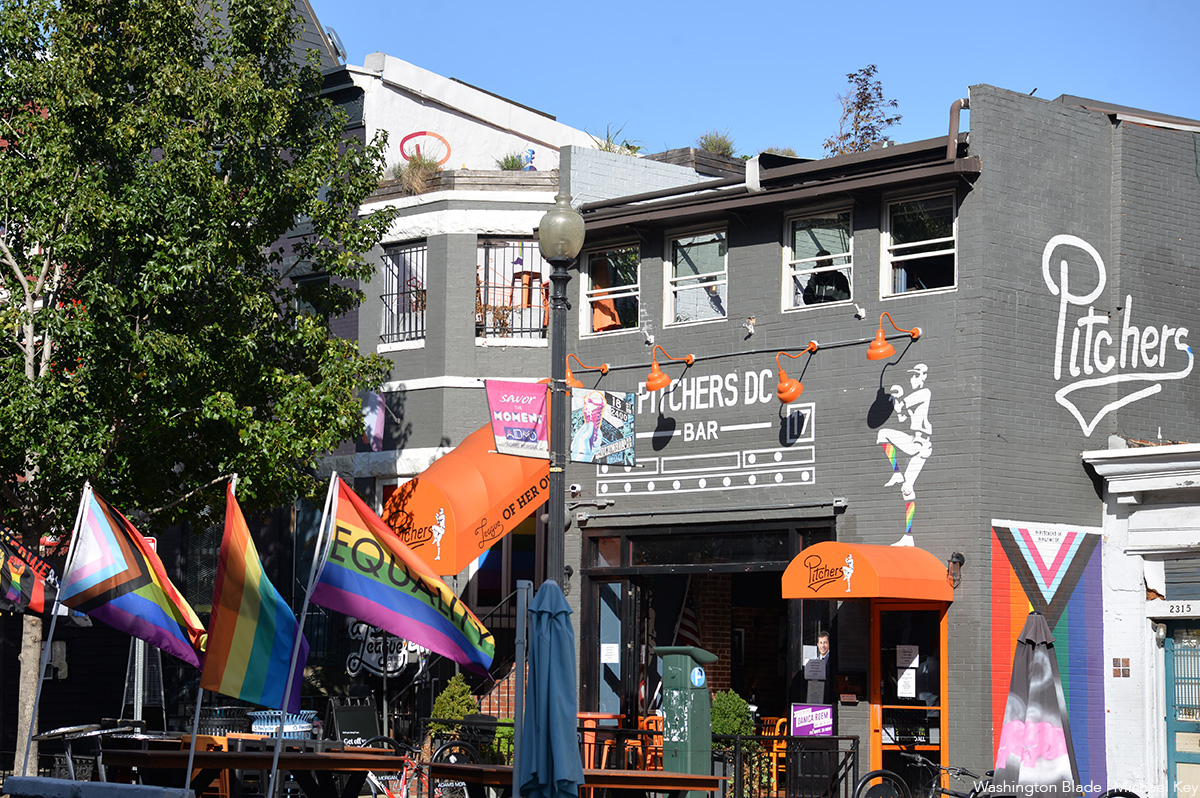
A Santa Monica, Calif.-based commercial real estate company called Zacuto Group has released a 20-page online brochure announcing the sale of the D.C. LGBTQ sports bar Pitchers and its adjoining lesbian bar A League of Her Own.
The brochure does not disclose the sale price, and Pitchers owner David Perruzza told the Washington Blade he prefers to hold off on talking about his plans to sell the business at this time.
He said the sale price will be disclosed to “those who are interested.”
“Matthew Luchs and Matt Ambrose of the Zacuto Group have been selected to exclusively market for sale Pitchers D.C., located at 2317 18th Street, NW in Washington, D.C located in the vibrant and nightlife Adams Morgan neighborhood,” the sales brochure states.
“Since opening its doors in 2018, Pitchers has quickly become the largest and most prominent LGBTQ+ bar in Washington, D.C., serving as a cornerstone of D.C.’s modern queer nightlife scene,” it says, adding, “The 10,000+ SF building designed as a large-scale inclusive LGBTQ+ sports bar and social hub, offering a welcoming environment for the entire community.”
It points out that the Pitchers building, which has two years remaining on its lease and has a five-year renewal option, is a multi-level venue that features five bar areas, “indoor and outdoor seating, and multiple patios, creating a dynamic and flexible layout that supports a wide range of events and high customer volume.”
“Pitchers D.C. is also home to A League of Her Own, the only dedicated lesbian bar in Washington, D.C., further strengthening its role as a vital and inclusive community space at a time when such venues are increasingly rare nationwide,” the brochure says.
Zacuto Group sales agent Luchs, who serves as the company’s senior vice president, did not immediately respond to a phone message left by the Blade seeking further information, including the sale price.
News of Perruzza’s decision to sell Pitchers and A League of Her Own follows his Facebook postings last fall saying Pitchers, like other bars in D.C., was adversely impacted by the Trump administration’s deployment of National Guard soldiers on D.C. streets
In an Oct. 10 Facebook post, Perruzza said he was facing, “probably the worst economy I have seen in a while and everyone in D.C. is dealing with the Trump drama.” He told the Blade in a Nov. 10 interview that Pitchers continued to draw a large customer base, but patrons were not spending as much on drinks.
The Zacuto Group sales brochure says Pitchers currently provides a “rare combination of scale, multiple bars, inclusivity, and established reputation that provides a unique investment opportunity for any buyer seeking a long-term asset with a loyal and consistent customer base,” suggesting that, similar to other D.C. LGBTQ bars, business has returned to normal with less impact from the Trump related issues.
The sales brochure can be accessed here.




















